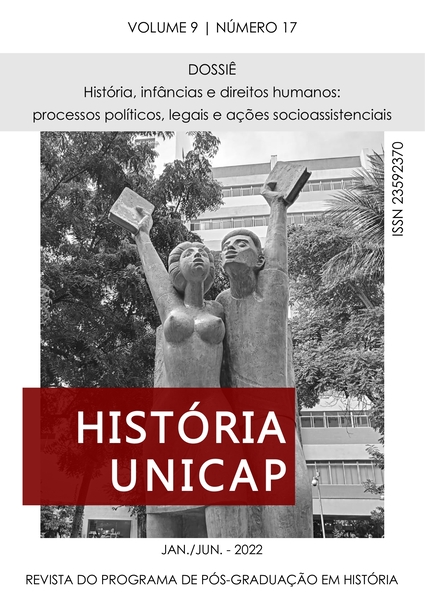History for elementary school in the Common National Curricular Base
a reflection from the critical theory of curriculum
DOI:
https://doi.org/10.25247/hu.2022.v9n17.p91-105Keywords:
Common National Curricular Base, Elementary School, History TeachingAbstract
This text seeks to undertake reflections and discussions around the for the Teaching of History related to the stage of elementary school of national basic education in the light of critical theorizations of school education. It is intended to show in this text that BNCC is a normative and defining text of the national curriculum policy in response to national and international market interests from a proposed schooling based on the development of skills and competencies for life in a social formation marked by the force of big capital. The present article was originated from a qualitative research based on bibliographic and documental methodology, supported by authors affiliated to critical theorizations of school education and History Teaching. In the end, it is believed that it was possible to demonstrate, in this text, that despite the BNCC claiming to be a normative document with purposes that direct Brazilian education to the full human training and the construction of a fair, democratic and inclusive society ultimately, however, it is perceived, by the analysis undertaken here, inconsistencies and incompatibilities which deny these same purposes and objectives listed above.
Downloads
References
ABUD, K. M. Currículos de História e políticas públicas: os programas de história do Brasil na escola secundária. In:
BITTENCOURT, Circe (org.). O saber histórico na sala de aula. 12. ed. São Paulo: Contexto, 2020.
ALVES FILHO, M. Base Curricular é conservadora, privatizante e ameaça autonomia, avaliam especialistas. Jornal da Unicamp. Campinas, 04 dez 2017. Notícias. Disponível em <https://www.unicamp.br/unicamp/index.php/ju/noticias/2017/12/04/base-curricular-e-conservadora-privatizante-e-ameaca-autonomia-avaliam> Acesso em: 10 jan 2022.
APPLE, M. W. A política do conhecimento oficial: faz sentido a ideia de um currículo nacional? In: MOREIRA, A. F.; TADEU, T. (orgs.) Currículo, cultura e sociedade. 12. ed. São Paulo: Cortez, 2011. p. 71-106.
BARBOSA, P. P. L.; LASTÓRIA, A. C.; CARNIEL, F. S. Reflexões sobre a História escolar e o ensino por competências na BNCC. Faces da História, Assis, v. 6, n. 2, p.513-528, jul/dez, 2019.
BORGES, V. P. O que é História ? São Paulo: Brasiliense, 2005.
BRASIL. Ministério da Educação. Base Nacional Comum Curricular. Brasília: MEC/SEB, 2018.
DOURADO, L. F.; SIQUEIRA, R. M. A arte do disfarce: BNCC como gestão e regulação do currículo, Revista Brasileira de Política e Administração da Educação - v. 35, n. 2, p. 291 - 306, mai/ago, 2019.
FERREIRA, D. da S.; ACIOLY, J. S. A Base Nacional Comum Curricular de História: orientações gerais para os anos iniciais. In: SANTOS, K. de O.; ROCHA, P. R. L.da; MELO, S. C. da S. (orgas.) Educação, Currículo e Formação de Professores: Debates Contemporâneos. Arapiraca: EDUNEAL, 2020. p. 61-80.
HORN, G. B.; GERMINARI, G. D. O Ensino de História e seu currículo: teoria e método. Petrópolis: Vozes, 2006.
LOPES, A. C.; MACEDO, E. Teorias de Currículo. São Paulo: Cortez, 2011.
LOPES, S. C. Base Nacional Comum Curricular (BNCC): na contramão de uma formação crítica. Construir Resistências. Rio de Janeiro, 06 nov. 2021. Disponível em <https://construirresistencia.com.br/base-nacional-comum-curricular-bncc-na-contramao-de-uma-formacao-critica/> Acesso em 24 fev 2022.
MENDES, B. Ensino de história, historiografia e currículo de história. Revista Transversos. Rio de Janeiro, n. 18, abr. 2020, p. 01-21.
OLIVEIRA, M. M de. Como fazer pesquisa qualitativa. 3 ed. Petrópolis: Vozes, 2010.
PACHECO, J. A. Escritos Curriculares. São Paulo: Cortez, 2005.
PEREIRA, N. M.; RODRIGUES, M. C. M. BNCC e o passado prático: Temporalidades e produção de identidades no ensino de história. Archivos Analíticos de Políticas Educativas, v. 26, n.107, 2018. p. 01-19. Disponível em <http://dx.doi.org/10.14507/epaa.26.3494> Acesso em 20 fev 2022.
ESTEBAN, M. P. S. Pesquisa Qualitativa em Educação. Porto Alegre: AMGH Editora, 2010.
SILVA, T. T. da. Documentos de Identidade: uma introdução às teorias do currículo. 3. ed. Belo Horizonte: Autêntica, 2011.
Downloads
Published
Issue
Section
License
Copyright (c) 2022 HISTÓRIA UNICAP

This work is licensed under a Creative Commons Attribution 4.0 International License.
Concedo a Revista História Unicap o direito de primeira publicação da versão revisada do meu artigo, licenciado sob a Licença Creative Commons Attribution (que permite o compartilhamento do trabalho com reconhecimento da autoria e publicação inicial nesta revista).
Afirmo ainda que meu artigo não está sendo submetido a outra publicação e não foi publicado na íntegra em outro periódico e assumo total responsabilidade por sua originalidade, podendo incidir sobre mim eventuais encargos decorrentes de reivindicação, por parte de terceiros, em relação à autoria do mesmo.
Também aceito submeter o trabalho às normas de publicação da Revista História Unicap acima explicitadas.














 A História Unicap está licenciada com uma licença
A História Unicap está licenciada com uma licença 